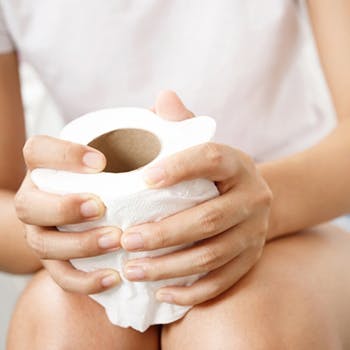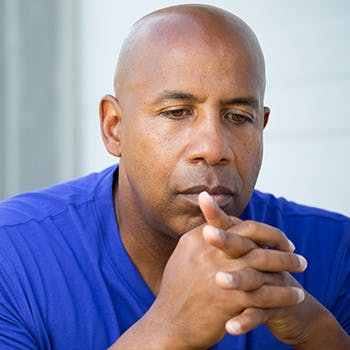The Connection Between Hemorrhoid Flare-Ups and Constipation

Having hemorrhoids is rarely a pleasant experience, but if you’re constipated and having a flare-up, you might feel even more uncomfortable. There is a connection between these occurrences, and thankfully, you can usually remedy constipation on your own. Learn how hemorrhoids and constipation are connected and what you can do about it.
What is Constipation?
If you haven’t pooped in a day or two, you might describe yourself as constipated. But in reality, constipation is a relatively complicated term that encompasses a few symptoms that you might not be aware of.1 Some of these symptoms include:1
- Less than three bowel movements in the span of a week.
- Straining to begin or complete a bowel movement.
- Feeling like you didn’t finish pooping, or like you didn’t get it all out.
- Stool that looks like many rocks or pebbles.
Why Do We Get Constipated?
If you’re feeling blocked up, you’re not alone: as many as one in five people experiences chronic constipation.1 There are a few main reasons that someone might be constipated, and they can generally be sorted into three categories:1
- Pelvic floor dysfunction: One major cause of constipation is weak muscles in the pelvic floor. These muscles move your stool through your rectum, and if they’re not strong enough to effectively perform their duty, you may find that you’re blocked up and uncomfortable.
- Neurological problems: Certain conditions like Parkinson’s disease and multiple sclerosis may impact the movement of stool through the digestive tract, because the nerves aren’t signaling as they should.
- Slowed movement: Low-fiber diets, dehydration and interactions with certain medications, like antidepressants or narcotic pain medication, may slow the movement of stool through your digestive tract and potentially lead to intestinal obstruction.
Stress may also be a factor for constipation. During stressful situations, your body releases a hormone called epinephrine, which diverts blood flow away from your intestines to organs like your brain and heart. This can slow intestinal movement.2 Another hormone is released in response to stress that directly impacts the intestines and can cause them to become inflamed, potentially leading to constipation.2
Can Constipation Cause Hemorrhoids?
Hemorrhoids are incredibly common and are the result of increased pressure on the anus, which causes veins and tissue in that region to swell.3,4 This pressure can lead to hemorrhoids and their associated discomfort and even bleeding during bowel movements.3 This pressure is commonly caused by:3,4
- Constipation
- Straining during bowel movements
- Sitting on the toilet for long periods of time
There are other causes of hemorrhoids, of course. They’re incredibly common during pregnancy and childbirth and during cases of having chronic diarrhea or constipation.3,4 But one of the primary causes is constipation and related activities like straining and spending time on the toilet.
How Can I Avoid Constipation?
Thankfully, mild constipation can be managed through lifestyle changes such as eating more fiber, exercising, drinking more water and not waiting to use the restroom.1,4 While it may feel unavoidable in the moment, try not to strain on the toilet if you’re blocked up, since this additional pressure may lead to a hemorrhoid flare-up.
If your constipation is more severe, you may need to meet with a doctor or health professional who can steer you in the right direction in terms of treatment. There are some warning signs of illness that may present themselves during constipation that should not be ignored, like weight loss, bleeding and stools that are consistently pencil-thin.1
If you’re experiencing a hemorrhoid flare-up due constipation, you can find relief by using Preparation H products. They soothe external and internal discomfort so you can get out of the bathroom, and on with your day.



